

Instructional Strategies for Students with Significant Disabilities. Marzano's High Yield Instructional Strategies. LIS Blogs to Read. Flipped Classroom Model: Why, How, and Overview. Hacking School Libraries Virtual Summit "The Digital Librarian's Survival Toolkit" Release Party. Library and Information Science: A Guide to Online Resources. General Guides Cataloging Resources Current Awareness Library Directories Library Associations Library Electronic Mail Lists General Guides There are many subject guides to print and online literature in the field of library and information science.
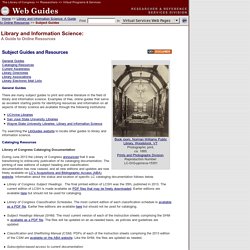
Examples of free, online guides that serve as excellent starting points for identifying resources and information on all aspects of library science are available through the following institutions: Try searching the LibGuides website to locate other guides to library and information science. LISSA - Professional Development Reimbursements. Applying for PDR funds can be easy!
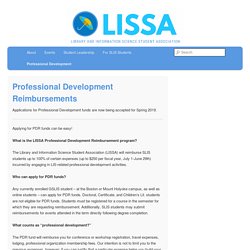
What is the LISSA Professional Development Reimbursement program? The Library and Information Science Student Association (LISSA) will reimburse SLIS students up to 100% of certain expenses (up to $250 per fiscal year, July 1-June 29th) incurred by engaging in LIS-related professional development activities. Who can apply for PDR funds? Any currently enrolled GSLIS student – at the Boston or Mount Holyoke campus, as well as online students – can apply for PDR funds.
Doctoral, Certificate, and Children’s Lit. students are not eligible for PDR funds. What counts as “professional development?” The PDR fund will reimburse you for conference or workshop registration, travel expenses, lodging, professional organization membership fees. Improve Your Search Strategies, Lesson 1. A Disproportionate Pandemic. Before COVID-19 came along, 18-year-old Jack Miller, who has autism, visited the main location of Gail Borden Public Library District (GBPLD) in Elgin, Illinois, three times a week.
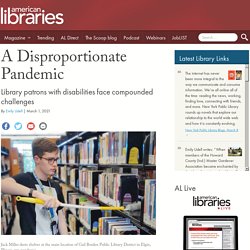
On two of those visits, he dusted books, alphabetized DVDs, and performed other tasks as part of his school’s special-education vocational studies program; on the third, he came with his family to check out his favorite Impressionist art books and play games in the library’s computer lab—even though he has access to the same games at home. “He is so routine-driven that he never considers doing ‘home’ things at the computer lab or ‘computer lab’ things at home,” says his mom, Rebecca Miller. “Being able to do these things at home is not the same to him at all.” In addition, using the computer lab gave Jack a taste of what his mom calls “sheltered independence.”
15 Non-librarian blog(ger)s too good to miss! It occurs to me that so many of my best ideas come from the blogs of others.
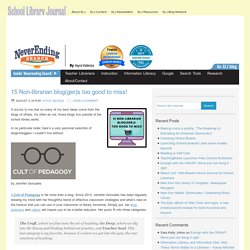
As often as not, those blogs live outside of the school library world. In no particular order, here’s a very personal selection of blogs/bloggers I couldn’t live without. 1.Cult of Pedagogy is far more than a blog. Teachers, Let’s Stop Assigning Harmful Books. (Note: This post has been in draft for a few weeks now.
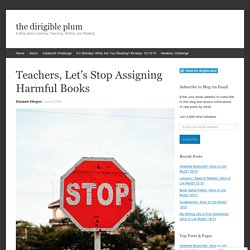
I’ve felt more urgency to finish in the last couple of days–especially as I see The Help trending on Netflix. That is NOT the film we need right now. Or anytime.) The other day I saw a tweet from a teacher asking for book recommendations for their high school literature class. The curriculum already included the usual classics, and this teacher wanted to incorporate more contemporary literature. The Help? Because it is a harmful novel. Knowingly and unknowingly, I’ve taught books that are harmful. eBooks Glide into Gale In Context: Elementary - Gale Blog. Coming this spring!
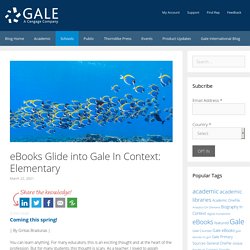
| By Gintas Bradunas | You can learn anything. Hacking School Libraries Virtual Summit: Equity, Accessibility, and Social Emotional Learning. How User-Friendly Is Your Website? As the pandemic has limited in-person library services this year, many libraries are relying on their websites more than ever to deliver the services their communities need and expect.
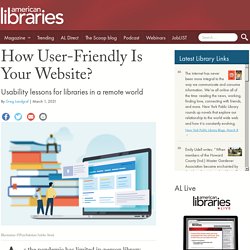
But a website is useful only if it enables patrons to find and do what they need. The increased importance of library websites during the COVID-19 era has highlighted common usability shortcomings—and opportunities. “I get the feeling that many people think usability comes second to utility,” says Christina Manzo, user experience librarian at Radford University Carilion in Roanoke, Virginia. “I think they’ve become one and the same. There’s a seemingly endless supply of interfaces competing for our attention, so users are less willing to put up with a website that doesn’t work well.” Manzo says the pandemic has not changed user needs, but amplified them. Maria Nuccilli, web developer at Wayne State University Library System in Detroit, reports increased website usage across the board. Testing solutions. American Libraries Live Webcasts, Training, and Recorded Workshops. Join library experts and hundreds of your colleagues for interactive discussions on pressing issues in modern librarianship.
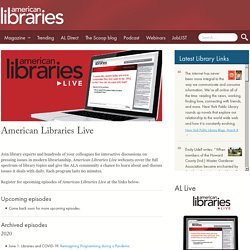
American Libraries Live webcasts cover the full spectrum of library topics and give the ALA community a chance to learn about and discuss issues it deals with daily. Each program lasts 60 minutes. Register for upcoming episodes of American Libraries Live at the links below. Library After Dark: After-Hours Programming for Adults. Libraries Matter: Early Literacy.